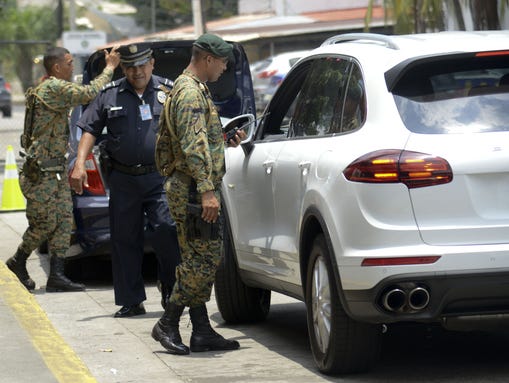Luke Skywalker
Super Moderator
{vb:raw ozzmodz_postquote}:
Cuban President Raul Castro and U.S. President Barack Obama shaking hands(Photo: AFP/Getty Images)
PANAMA CITY — President Obama and Cuban President Raúl Castro had a much-anticipated handshake at the Summit of the Americas Friday, another historic step toward defrosting five decades of icy relations between the two countries.
The handshake happened as the two leaders arrived at a Panama City convention center for the summit's opening ceremonies, mostly away from most journalists' view. But a reporter for a Venezuelan TV network posted video online showing the two greeting each other comfortably with multiple handshakes and small talk, while U.N. Secretary-General Ban Ki-moon and Cuban Foreign Minister Bruno Rodriguez looked on.
The handshake was the latest of a series of clear steps the past few days signaling the two countries are continuing on their path toward normalizing relations, including opening embassies in both countries.
The White House said the interaction was informal and said they didn't engage in substantive conversation. The two men are expected to meet for substantial talks Saturday, just days after the pair spoke by phone to pave the way for more meaningful discourse here. "We don't have a formal meeting scheduled at a certain time, but we anticipate they will have a discussion tomorrow," Deputy National Security Advisor Ben Rhodes said Friday.
USA TODAY
Diplomatic road may be bumpy for U.S. at Panama summit
Obama and Castro arrived minutes apart in Panama City on Thursday evening for the summit, which runs through Saturday. Obama's anticipated interaction with Castro at the conference marks not just a step toward normalized relations between the two countries, but also a revamping of U.S. standing in the region, said Richard Feinberg, senior fellow at the Brookings Institution.
By engaging Cuba, "President Obama has turned what is a major thorn with the entire hemisphere into a strong positive," said Feinberg, who is one of the original founders of the summit that began in 1994. "Ironically, Cuba and Raúl Castro now provide a shield to the United States against criticism from other left-leaning governments in Latin America."
Even as the two leaders acted cordially, tensions remained high Friday between pro- and anti-Castro activists outside the meetings. The two groups had a tense stand off in the lobby of the Hotel El Panama, yelling insults at one another. That incident came two days after a group of pro-Castro demonstrators chased and beat a group of dissidents attempting to lay flowers near the Cuban embassy here.
In a speech at the Civil Society Forum Friday, Obama urged member nations to be tolerant of opposing voices and allow civil society a more inclusive role. " I recognize there's strong differences about the role of civil society, but I believe we can all benefit from open and tolerant and inclusive dialogue," he said. "And we should reject violence or intimidation that's aimed at silencing people's voices."
USA TODAY
Cuba protests make waves at Panama summit
The United States and Cuba have been working to restore diplomatic ties since December, when Obama held the first conversation between U.S. and Cuban leaders in more than a half-century as part of the first steps toward normalizing ties.
In late 2013, Obama became the first U.S. president since 2000 to shake hands with a Cuban leader when the two exchanged the gesture as they took seats at a memorial service for Nelson Mandela.
Panamanian Army soldiers check drivers near the Atlapa Convention center before the opening ceremony of the VII Summit of the Americas in Panama City on April 10, 2015.<span style="color: Red;">*</span>(Photo: Raul Arboleda, AFP/Getty Images)
Around downtown Panama City, police blocked off streets with barricades, and black-beret National Police troops stood at nearly every street corner. Snipers were perched on rooftops. Panamanians were given the day off, allowing for less congestion.
The center of activity Friday morning was the Hotel Riu Plaza Panama, where a parallel CEO forum was being held. Secretary of State John Kerry arrived, as did Latin American leaders. Obama was expected to attend the forum later in the day, followed by a visit to a Civil Society Forum at another hotel.
In another major event, Kerry and Cuban Foreign Minister Bruno Rodriguez met Thursday evening in what the State Department called "a lengthy and very constructive discussion."
"The two agreed they made progress and that we would continue to work to resolve outstanding issues," the department said in a statement.
The developments came as Obama said he would soon decide whether to remove Cuba as a state sponsor of terrorism. The president said in Jamaica on Thursday that the State Department has completed its review on the issue but he has yet to receive its recommendation.
Removal from the list after 33 years would allow American banks and businesses to operate in Cuba, and clear an impediment to full diplomatic relations with the United States. If talks at the summit go well, other announcements could include the reopening of embassies and other steps to normalized ties.
USA TODAY
Cuba still provides sanctuary for wanted terrorists
contributing: Associated Press
Powered By WizardRSS.com | Full Text RSS Feed
